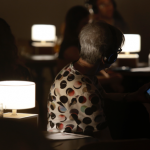In ‘Smartphones are Hot’, Nicholas Carr (author of The Shallows) makes some interesting comments about the functions and impact of the smartphone. When describing the multiple capabilities of a smartphone, he describes it as ‘Whitmanesque’, perhaps thinking of section 51 of Walt Whitman’s ‘Song of Myself’: ‘Do I contradict myself? Very well, then I contradict myself. / (I am large, I contain multitudes.)’ Carr goes on to describe our engagement with smartphones: ‘To look into the screen of a smartphone is to be lost to the world. Like every hot medium, the smartphone isolates and fragments the self. It individualizes, alienates […] At the very least, one could say that the smartphone creates an environment that encourages participation at a distance: participation as performance.’ It is this final sentence that makes Carr’s argument intriguing yet, in 2018 (four years after Carr’s blog was posted), somewhat conflicting. Whilst our phones certainly prompt agency, this engagement is becoming increasingly involved and intimate. It is true that our participation is performative, but this is precisely what makes it involved, sensory, and almost tangible. As our phones connect us to the world around us, our performance as online ‘characters’ (that we carefully cultivate via social media sights such as Facebook and Instagram) is an immersive, rather than distant, experience. Due to the plethora of social media networks, we exist as multiple selves and interact with many different social groups and relations from family members and close friends to one-time acquaintances and employers. Thus as we share our likes, thoughts, purchases, family albums, and job promotions with those near and far, we are truly immersed in our online worlds. Mark Zuckerberg alluded to the possibility of a fully immersive digital world when he said: ‘One day, I believe we’ll be able to send full, rich thoughts to each other directly using technology. You’ll just be able to think of something and your friends will immediately be able to experience it too if you’d like. The world would be the ultimate communication technology.’ The price to pay, however, for this in-tuneness between our daily lives and online presence, is our privacy. Today, the screen is no longer a shield to hide behind, but a window through which we are perceived and perceive others. As a result, the primary function of the world wide web – to openly connect and make information available – is the very thing that can unsettle and deter its users. In a Supreme Court statement from 1963, Chief Justice Earl Warren warned: ‘The fantastic advances in the field of electronic communication constitute a great danger to the privacy of the individual.’ As Facebook notifies us of our friends and Google’s predictive search tells us what we’re thinking, it may not be an exaggeration to suggest that our virtual existence is superseding our physical one. As our smartphones have become part of our survival kit, for nobody leaves the house without the sacred trinity of ‘purse, keys, phone’, their status has risen from accessory to necessity. We depend on them for comfort, connection and direction to such an extent that they are remoulding the shape of our hand. Perhaps it is time for a Song of Ourselves for a social media age:
I celebrate myself, and sing myself,
And what I assume you shall assume,
For every atom belonging to me as good belongs to you.
For Carr’s article ‘Smartphones are Hot’ see: http://www.roughtype.com/?p=5220
















